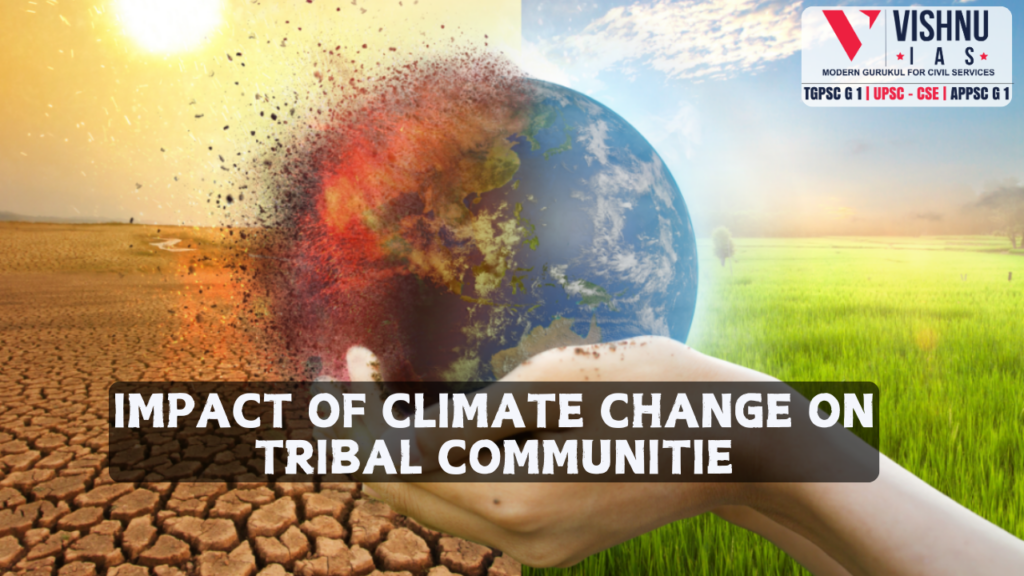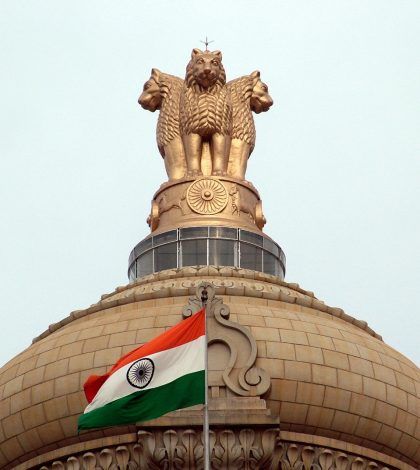Impact of Climate Change on Tribal Communities
Approach
- Introduction: add few introductory lines about the tribals and their critical role in preserving biodiversity and maintaining ecological balance.
- Body: add comprehensive analysis about the critical evaluation of given statement as Custodians of natural resources are the tribals, but they are the most deprived and critically examine how climate change will impact their survival in future.
- Conclusion: add its present relevance in contemporary society
INTRODUCTION
Tribal communities, often referred to as the custodians of natural resources, play a crucial role in preserving biodiversity and maintaining ecological balance. Despite their significant contributions, they are among the most deprived and vulnerable groups, facing numerous challenges exacerbated by climate change.
BODY
Tribal communities have long been recognized as the custodians of natural resources due to their deep-rooted connection with the environment and their sustainable practices. However, despite their crucial role, they are among the most deprived and marginalized groups. This analysis will delve into the reasons behind this paradox and critically examine how climate change will impact their survival in the future.
Let’s critically examine how climate change impacts their survival:
The Role of Tribals as Custodians
Tribal communities possess extensive traditional ecological knowledge that has been passed down through generations. This knowledge encompasses sustainable agricultural practices, forest management, and biodiversity conservation. For example:
- Agricultural Practices: Tribals often practice shifting cultivation, which allows the land to regenerate and maintain soil fertility.
- Forest Management: They engage in activities like controlled burning and selective logging to maintain forest health.
- Biodiversity Conservation: Tribals protect various plant and animal species, understanding their roles in the ecosystem.
Deprivation and Marginalization
Despite their environmental stewardship, tribal communities face significant socio-economic challenges:
- Land Dispossession: Development projects, mining, and deforestation often lead to the displacement of tribal communities from their ancestral lands. This not only disrupts their way of life but also deprives them of their primary source of livelihood.
- Economic Marginalization: Tribals frequently lack access to basic services such as education, healthcare, and employment opportunities. This economic marginalization perpetuates a cycle of poverty.
- Political Exclusion:Tribal communities are often excluded from decision-making processes that affect their lands and resources. This exclusion limits their ability to advocate for their rights and interests.
Impact of Climate Change on Tribal Communities
Climate change poses a severe threat to the survival of tribal communities. The impacts include:
- Loss of Livelihoods: Climate change affects agriculture, fishing, and hunting, which are primary sources of livelihood for many tribal communities. For instance, changing rainfall patterns and prolonged droughts can lead to crop failures and reduced food security.
- Displacement:Rising sea levels, extreme weather events, and changing ecosystems force tribes to relocate from their ancestral lands. This displacement disrupts their social structures and cultural practices.
- Health Risks:Increased temperatures and changing weather patterns lead to health issues such as heat stress, malnutrition, and the spread of vector-borne diseases. Tribals, with limited access to healthcare, are particularly vulnerable.
- Cultural Erosion:The loss of land and natural resources disrupts traditional practices and cultural heritage. For example, the relocation of communities due to flooding or other climate impacts can lead to the loss of sacred sites and traditional knowledge.
Strategies for Mitigation and Adaptation
To ensure the survival of tribal communities in the face of climate change, several strategies can be implemented:
- Empowering Tribal Sovereignty: Recognizing and respecting tribal sovereignty in environmental governance can enhance their resilience to climate change. This includes involving tribal communities in decision-making processes and respecting their land rights.
- Integrating Traditional Knowledge: Incorporating indigenous knowledge into climate adaptation and mitigation strategies can provide sustainable solutions. For example, traditional water management practices can be integrated into modern water conservation efforts.
- Providing Resources and Support: Governments and organizations should provide financial and technical support to tribal communities for climate adaptation projects. This includes funding for sustainable agriculture, renewable energy projects, and disaster preparedness programs.
- Promoting Education and Awareness:Enhancing education and awareness about climate change impacts and adaptation strategies within tribal communities can empower them to take proactive measures.
CONCLUSION
Tribal communities are indeed the custodians of natural resources, yet they face significant deprivation and marginalization. Climate change exacerbates these challenges, threatening their livelihoods, health, and cultural heritage. Addressing these issues requires a multifaceted approach that empowers tribal sovereignty, integrates traditional knowledge, and provides necessary resources and support.
Anthropology Full Course at Vishnu IAS Academy
What does Course Offer?
- 4 Months (250+ Class Hours)
- Online (App + Web) / Offline / Hybrid Mode of Classes
- Live + Recorded Videos Access For 1 Year
- 2 Hour Live Class From Monday to Saturday (1.5 Hours for Class + ½ Hour for Doubt Solving)
- Foundation to Advanced Level of Teaching
- Simple and Integrated Content
- One Stop Solution Books
- Regular Value Added Content
- Current Affairs & Case Studies Modules
- Daily Answer Writing Practice
- Weekly Grand Tests On Sundays & Evaluation With Guidance and Topper Will be Rewarded
- 500+ Model Answers
- 9 AM – 9 PM Support System
- Free GS Current Affairs
- Free Interview Guidance for Anthropology


